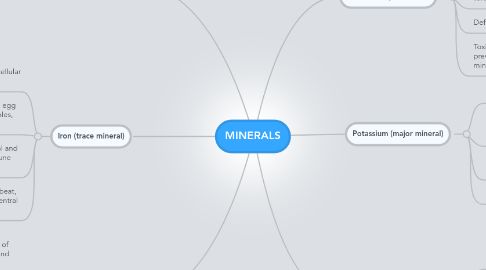MINERALS
作者:Kyaw Soe Maung

1. Sodium chloride (major mineral)
1.1. Functions: Chloride required for the production of hydrochloric acid in the stomach, sodium allows the control of nerves and muscles, sodium and chloride regulate fluid in our body.
1.2. Sources: Table salt, a wide variety of fresh food, seasonings, processed food.
1.3. Deficiencies: Muscle cramps, diarrhoea, vomiting.
1.4. Toxicity: Bloating and swelling of tissues due to water retention, hypertension.
2. Iron (trace mineral)
2.1. Functions: Essential for the formation of haemoglobin and myoglobin, required for cellular respiration.
2.2. Sources: Red meat, liver, egg yolk, dark green vegetables, cereals.
2.3. Deficiencies: Anaemia, abnormal and continuous bleeding, poor immune system.
2.4. Toxicity: Diarrhoea, dizziness, rapid heartbeat, damage to the heart, liver, kidneys and central nervous system.
3. Iodine (trace mineral)
3.1. Function: Essential for the production of thyroxine, promotes general growth and development of our body.
3.2. Sources: Seafood, seaweed, lodized salt.
3.3. Deficiencies: Slow physical and mental processes, weight gain, lethargy.
3.4. Toxicity: Acnc-like leisons on the skin, goitre.
4. Calcium (major mineral)
4.1. Functions: Works with phosphorus and vitamin D to build strong bones and teeth, needed for normal blood clotting, needed for muscular and nerve function.
4.2. Sources: Dairy products, fish with edible bones, vegetables, tofu.
4.3. Deficiencies: Osteoporosis
4.4. Toxicity: Formation of kidney stones, prevents the absorption of other minerals.
5. Potassium (major mineral)
5.1. Functions: Works with sodium to regulate fluid movement in and out of body cell, essential for muscle development and nerve function.
5.2. Sources: Fruit, vegetables, dairy products, seafood, whole-grain food, meat.
5.3. Deficiencies: Loss of appetite, fatigue, muscle weakness.
5.4. Toxicity: Heart attack.
6. Phosphorus (major mineral)
6.1. Functions: Works with calcium and vitamin D to build and maintain bones and teeth, required for the conversion of carbohydrates and fats into energy, helps maintain fluid balance in our body.
6.2. Sources: Dairy products, meat, fish, eggs, cereals.
6.3. Deficiencies: Bones loss, stunted growth, poor dental health.
6.4. Toxicity: Spasms, convulsions.


